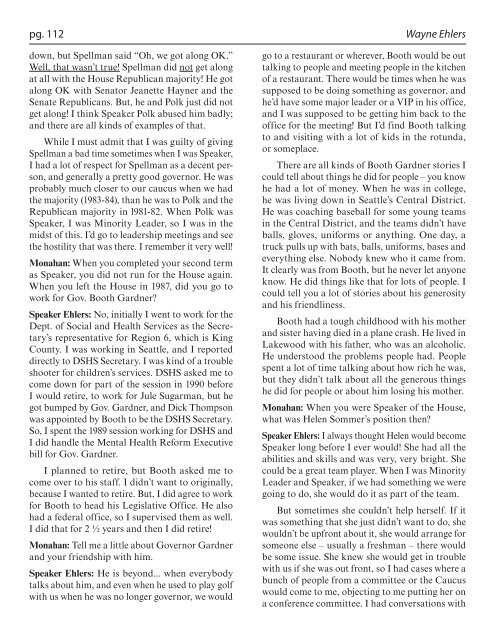Helen Sommers: An Oral History
Helen Sommers: An Oral History
Helen Sommers: An Oral History
Create successful ePaper yourself
Turn your PDF publications into a flip-book with our unique Google optimized e-Paper software.
pg. 112 Wayne Ehlers<br />
down, but Spellman said “Oh, we got along OK.”<br />
Well, that wasn’t true! Spellman did not get along<br />
at all with the House Republican majority! He got<br />
along OK with Senator Jeanette Hayner and the<br />
Senate Republicans. But, he and Polk just did not<br />
get along! I think Speaker Polk abused him badly;<br />
and there are all kinds of examples of that.<br />
While I must admit that I was guilty of giving<br />
Spellman a bad time sometimes when I was Speaker,<br />
I had a lot of respect for Spellman as a decent person,<br />
and generally a pretty good governor. He was<br />
probably much closer to our caucus when we had<br />
the majority (1983-84), than he was to Polk and the<br />
Republican majority in l981-82. When Polk was<br />
Speaker, I was Minority Leader, so I was in the<br />
midst of this. I’d go to leadership meetings and see<br />
the hostility that was there. I remember it very well!<br />
Monahan: When you completed your second term<br />
as Speaker, you did not run for the House again.<br />
When you left the House in 1987, did you go to<br />
work for Gov. Booth Gardner?<br />
Speaker Ehlers: No, initially I went to work for the<br />
Dept. of Social and Health Services as the Secretary’s<br />
representative for Region 6, which is King<br />
County. I was working in Seattle, and I reported<br />
directly to DSHS Secretary. I was kind of a trouble<br />
shooter for children’s services. DSHS asked me to<br />
come down for part of the session in 1990 before<br />
I would retire, to work for Jule Sugarman, but he<br />
got bumped by Gov. Gardner, and Dick Thompson<br />
was appointed by Booth to be the DSHS Secretary.<br />
So, I spent the 1989 session working for DSHS and<br />
I did handle the Mental Health Reform Executive<br />
bill for Gov. Gardner.<br />
I planned to retire, but Booth asked me to<br />
come over to his staff. I didn’t want to originally,<br />
because I wanted to retire. But, I did agree to work<br />
for Booth to head his Legislative Office. He also<br />
had a federal office, so I supervised them as well.<br />
I did that for 2 ½ years and then I did retire!<br />
Monahan: Tell me a little about Governor Gardner<br />
and your friendship with him.<br />
Speaker Ehlers: He is beyond... when everybody<br />
talks about him, and even when he used to play golf<br />
with us when he was no longer governor, we would<br />
go to a restaurant or wherever, Booth would be out<br />
talking to people and meeting people in the kitchen<br />
of a restaurant. There would be times when he was<br />
supposed to be doing something as governor, and<br />
he’d have some major leader or a VIP in his office,<br />
and I was supposed to be getting him back to the<br />
office for the meeting! But I’d find Booth talking<br />
to and visiting with a lot of kids in the rotunda,<br />
or someplace.<br />
There are all kinds of Booth Gardner stories I<br />
could tell about things he did for people – you know<br />
he had a lot of money. When he was in college,<br />
he was living down in Seattle’s Central District.<br />
He was coaching baseball for some young teams<br />
in the Central District, and the teams didn’t have<br />
balls, gloves, uniforms or anything. One day, a<br />
truck pulls up with bats, balls, uniforms, bases and<br />
everything else. Nobody knew who it came from.<br />
It clearly was from Booth, but he never let anyone<br />
know. He did things like that for lots of people. I<br />
could tell you a lot of stories about his generosity<br />
and his friendliness.<br />
Booth had a tough childhood with his mother<br />
and sister having died in a plane crash. He lived in<br />
Lakewood with his father, who was an alcoholic.<br />
He understood the problems people had. People<br />
spent a lot of time talking about how rich he was,<br />
but they didn’t talk about all the generous things<br />
he did for people or about him losing his mother.<br />
Monahan: When you were Speaker of the House,<br />
what was <strong>Helen</strong> Sommer’s position then?<br />
Speaker Ehlers: I always thought <strong>Helen</strong> would become<br />
Speaker long before I ever would! She had all the<br />
abilities and skills and was very, very bright. She<br />
could be a great team player. When I was Minority<br />
Leader and Speaker, if we had something we were<br />
going to do, she would do it as part of the team.<br />
But sometimes she couldn’t help herself. If it<br />
was something that she just didn’t want to do, she<br />
wouldn’t be upfront about it, she would arrange for<br />
someone else – usually a freshman – there would<br />
be some issue. She knew she would get in trouble<br />
with us if she was out front, so I had cases where a<br />
bunch of people from a committee or the Caucus<br />
would come to me, objecting to me putting her on<br />
a conference committee. I had conversations with
















